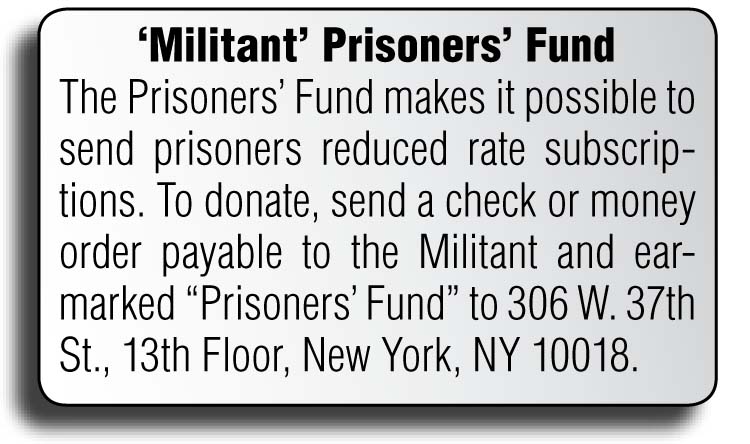

Vol. 78/No. 25 July 14, 2014
A new rule banning publications in California prisons that “indicate an association with groups that are oppositional to authority and society” has been inserted into six pages of proposed “Obscene Material Regulations,” which revolve around censorship of pornography.
“We have to vigorously challenge this new attempt by the CDCR [California Department of Corrections and Rehabilitation] to confiscate books, magazines, newspapers and newsletters,” Mutope Duguma, a prisoner in solitary in Pelican Bay wrote in the June issue of the San Francisco Bay View newspaper. “These new proposed regulations are designed to serve one purpose and that is to censor any writings, mailings and publications that educate the public to what is actually occurring in these prisons.”
The proposed regulations define as “contraband” any written materials or photographs in the hands of prisoners that indicate “an association with a validated member or associate of a Security Threat Group.” The so-called STGs include prison gangs or any group of three or more inmates that prison authorities designate as a threat.
“Whoever wrote the new regulations must have had us at the Bay View in mind,” Mary Ratcliff, editor of the paper, told the Militant July 1. Bay View has “a large number of subscribers in prison and among the public and offers inmates an opportunity for a dialogue with the public.” Through letters and articles from prisoners, “we report on what’s happening where journalists are not allowed to go,” she said. “The new regulations seek to end the dialogue, to cut off access to knowledge.”
Marie Levin, the sister of Sitawa Nantambu Jamaa, a leader of last year’s prison hunger strike, is one of many who sent letters of protest to the CDCR. “The hunger strikes were the reason the prisoners were able to get out the word to the public about prison conditions,” she told the Militant. “Now the rule is that if three or more get together and try to communicate about this with the outside, they can be punished.”
“My brother has educated himself in prison,” Levin said. “He loves literature. He will read a book many times and pass it on to others. He watches the news. They need books and newspapers to read and to communicate beyond the prison.”
At a June 17 public hearing here on the rule change, Joe Stein, chief of the Standardized Procedures Unit of the CDCR, answered questions about the new rules. Asked if an inmate could be punished for possession of a banned book or magazine such as Playboy, he answered “yes.” Some 200 publications are currently banned, he said.
“I’m concerned about this designation of books or photographs as contraband,” Nancy Leman, a former truck driver from Sacramento, told the hearing. “Anyone simply because of a tattoo, or having a photo of a relative, could be targeted.”
Betsey Stone, who has covered the California prisoners’ hunger strike for the Militant, spoke at the hearing about fights waged for the right of the socialist paper and other publications, including Prison Legal News, the San Francisco Bay View and Prison Focus to be received by prisoners.
“It’s crucial that prisoners have the right to study, read, write and communicate with others on the outside,” Stone said. “Especially needed are books about workers’ struggles. The fight for the First Amendment rights of prisoners is in the interests of all working people.”
In a related development, the Militant on June 12 filed an appeal seeking to reverse the first known censorship of the paper in a federal prison in decades. The warden at the high-security U.S. Penitentiary in Florence, Colorado, had confiscated an issue of the newsweekly on the basis that it supposedly contained “articles pertaining to the Revolutionary Communist Party in the USA and the need to overthrow the system.” The appeal, filed by attorney David Goldstein, pointed out that the move was a violation of the First Amendment, as well as prison regulations.
Ratcliff said the Bay View was notified in April this year that the warden at the maximum-security prison in Florence had censored the July 2013 issue of the paper on the basis that it discussed individuals incarcerated within the Federal Bureau of Prisons.

|